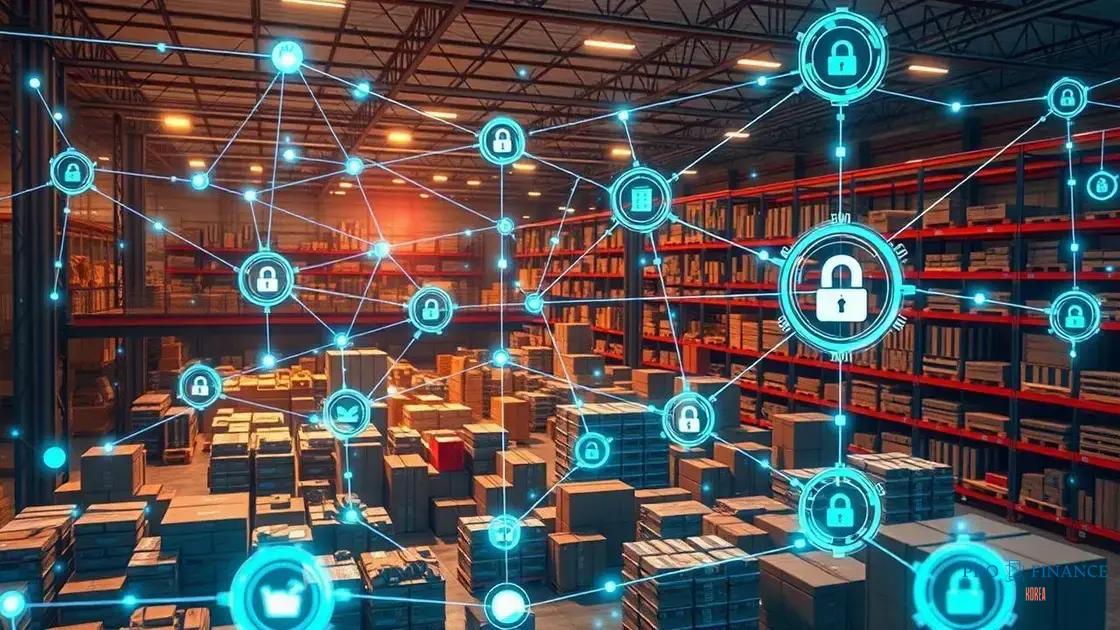How blockchain technology is transforming supply chain management

Blockchain technology is transforming supply chain management by enhancing transparency, efficiency, and security, enabling real-time tracking and fostering trust among all participants.
How blockchain technology is transforming supply chain management is a game changer for businesses looking to enhance transparency and efficiency. Have you ever wondered how this innovative technology could impact your operations?
Understanding blockchain technology
Understanding blockchain technology is essential in today’s digital landscape. This technology provides a way to securely record and verify transactions without the need for a central authority. Essentially, blockchain is a decentralized ledger, allowing for greater transparency and trust among parties involved.
With blockchain, information is stored in blocks that are linked together in chronological order. Each block contains a unique code, a timestamp, and details of the preceding block. This means that once a block is added to the chain, it becomes nearly impossible to alter, ensuring data integrity.
Key Features of Blockchain Technology
The features that make blockchain stand out include:
- Decentralization: Unlike traditional databases, blockchain is not controlled by a single entity.
- Transparency: All transactions are visible to participants, fostering trust.
- Security: Cryptographic techniques make it difficult for hackers to manipulate data.
Furthermore, blockchain’s smart contracts enable automated execution of agreements. These self-executing contracts reduce the need for intermediaries, lowering costs and speeding up processes.
The implications of understanding blockchain technology extend beyond cryptocurrencies. Industries like logistics, healthcare, and finance are adopting it to streamline their operations and enhance security. For example, in supply chain management, blockchain allows all parties to track products in real-time, minimizing fraud and errors.
By grasping how blockchain works, businesses can not only improve their efficiencies but also gain a competitive edge. The continuous evolution of this technology means staying informed is crucial for leveraging its full potential.
Key benefits for supply chains

The key benefits for supply chains using blockchain technology are numerous and impactful. By adopting this innovative solution, businesses can significantly enhance their operations. One of the most critical advantages is transparency. Each participant in the supply chain can access real-time data, which reduces discrepancies and fosters trust among all parties involved.
Another major benefit is the improved efficiency in tracking products. With blockchain, every transaction and change is recorded in a secure and permanent way. This allows stakeholders to monitor the movement of goods without delays, which is crucial for timely deliveries.
Cost Reductions
In addition to transparency and efficiency, blockchain can lead to significant cost reductions. By minimizing the need for intermediaries, companies can lower transaction fees and administrative costs. This streamlining of processes ultimately means savings that can be passed on to customers.
- Reduced fraud: Blockchain technology greatly decreases the chances of fraud by providing immutable records.
- Faster transactions: Smart contracts automate processes, speeding up the execution of agreements.
- Enhanced traceability: The ability to track products back through their entire supply chain increases accountability.
Moreover, as businesses embrace this technology, the potential for enhancing customer satisfaction grows. Customers appreciate knowing where their products come from and how they are transported. This greater level of accountability can improve brand loyalty and lead to repeat business.
Lastly, the potential for scalability cannot be overlooked. As companies grow, blockchain systems can adjust to accommodate increased business without significant disruptions. This adaptability makes it an attractive option for businesses looking to the future.
Real-world applications and examples
Real-world applications and examples of blockchain technology are changing how businesses operate today. Companies across various industries are harnessing this technology to improve efficiency, transparency, and trust in their operations. For example, the food industry utilizes blockchain to track the origin of products, ensuring safety and quality.
In retail, major brands implement blockchain to manage inventory more effectively. This allows companies to monitor their stock levels in real-time, reducing waste and improving sales forecasting. By integrating blockchain, they enhance customer trust by providing accurate product information.
Supply Chain Management
One prominent application is in supply chain management. Companies like Walmart use blockchain to trace the journey of food products from farm to store. This initiative helps quickly identify the source of contamination if there’s a food safety issue, ensuring consumer safety.
- Provenance tracking: This allows customers to see the history of their products.
- Real-time data sharing: All participants in the supply chain access the same information, increasing collaboration.
- Fraud prevention: Secure records minimize counterfeit products in the market.
Another example can be found in the finance sector. Financial institutions leverage blockchain for cross-border payments, enabling faster and cheaper transactions. Traditional banking processes can take days, but with blockchain, transactions can occur in minutes, greatly benefiting international businesses.
Healthcare is also exploring blockchain to store medical records. This method ensures that patient data is secure and only accessible to authorized individuals. Moreover, it simplifies the sharing of information among healthcare providers, significantly improving patient care.
Challenges in implementing blockchain

Implementing blockchain technology comes with several challenges that businesses must navigate. First, the complexity of technology can deter companies from adopting it. Many organizations lack the technical expertise needed to understand how blockchain operates and how to integrate it into their existing systems.
Additionally, there are significant cost considerations. Developing and maintaining a blockchain system requires upfront investments in technology and training. For small businesses, these costs can be prohibitive. Companies must weigh the potential benefits against these expenses carefully.
Scalability Issues
Another notable challenge involves scalability. As the number of transactions increases, the blockchain can become slow and less efficient. Businesses need to find solutions that allow for quick processing times without compromising security.
- Network congestion: As more users join the network, the speed of transactions can slow down.
- Data storage: Blockchain systems generate vast amounts of data, which must be stored securely and efficiently.
- Integration difficulties: Existing systems may not easily connect with new blockchain solutions, requiring additional development work.
Moreover, regulatory and compliance issues pose significant hurdles. Different countries have varying laws regarding cryptocurrencies and blockchain use. Companies must stay updated on regulations and ensure their practices comply with local laws to avoid legal issues.
Finally, there is the issue of user adoption. For blockchain technology to reach its full potential, all participants in a system must be willing to adopt it. Changing behaviors and getting everyone on board can be a lengthy and challenging process.
Future trends in supply chain management
Future trends in supply chain management are heavily influenced by advancements in technology, particularly blockchain. This technology is set to revolutionize how goods are tracked and managed from production to delivery. By providing a secure and transparent system, blockchain enhances trust among all parties in the supply chain.
One significant trend includes the increased adoption of automation. Automated systems streamline processes, reduce human error, and improve efficiency. Robots and machine learning algorithms are becoming integral in managing inventory and logistics.
Predictive Analytics
Alongside automation, predictive analytics is gaining traction. This approach analyzes historical data to forecast demand and supply trends. By understanding patterns, companies can make better decisions regarding stock levels and production schedules, preventing shortages or overstocking.
- Real-time data visibility: Companies will use technology to gain immediate access to information about products in transit.
- Integration of IoT: The Internet of Things will facilitate communication between devices, enhancing tracking and monitoring capabilities.
- Enhanced customer experience: Providing customers with accurate delivery times and product information will become standard.
Another emerging trend is sustainability in supply chains. As consumers become more eco-conscious, companies are focusing on reducing their carbon footprint. Blockchain can play a role in this by ensuring that products are sourced ethically and produced sustainably.
Finally, collaboration within supply chains is expected to grow. As businesses face common challenges, sharing resources and information will help them solve problems together. This collaborative approach can lead to stronger partnerships and increased overall efficiency.
In conclusion, blockchain technology is transforming supply chain management by enhancing transparency, efficiency, and security. As businesses continue to discover its benefits, they must also navigate challenges like implementation costs and regulatory compliance. Future trends indicate a shift towards automation, predictive analytics, and sustainability, making it essential for companies to adapt and embrace these innovations. By understanding and leveraging blockchain, organizations can not only improve their operations but also create more trustworthy and reliable supply chains.
FAQ – Frequently Asked Questions about Blockchain in Supply Chain Management
How does blockchain enhance transparency in supply chains?
Blockchain provides a secure and shared ledger, allowing all participants to view the same data in real-time, which builds trust.
What are the cost implications of implementing blockchain technology?
While there are upfront costs for setup and integration, businesses often find long-term savings through increased efficiency and reduced fraud.
What role does automation play in supply chain management?
Automation streamlines processes and reduces human error, which leads to faster operations and improved accuracy.
Why is sustainability important in supply chain practices?
Sustainability not only meets consumer demands for ethical practices but can also reduce costs and enhance brand loyalty.






